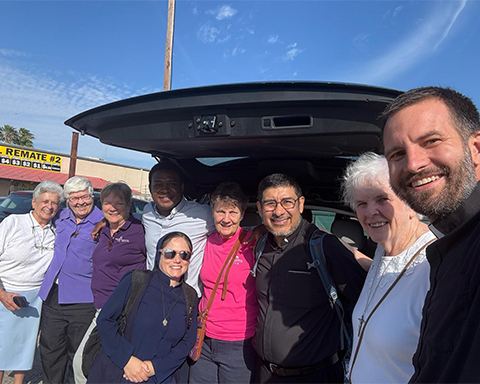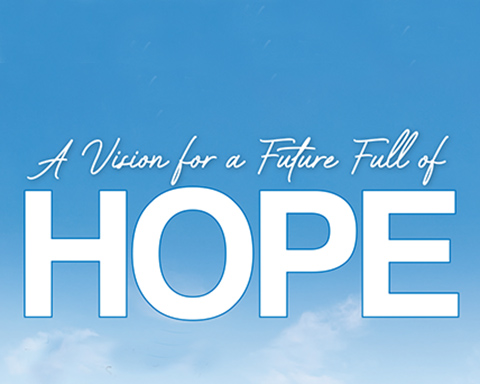News & Updates
What is Title 42, Title 8 and the CBP One App?
Because the number of those crossing into the US has decreased, there is a greater need to accompany migrants on the Mexican side of the border.
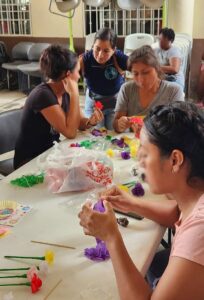
On May 11, 2023, the US government finally rescinded Title 42, a health policy that was invoked in March 2020 to prevent the spread of COVID-19 at US borders. Title 42 allowed US authorities to use the pandemic as justification for swiftly removing migrants crossing the US-Mexico border without hearing the requests and cases of asylum seekers. With the dissolution of Title 42, Title 8, the pre-pandemic law that governed the deportation of migrants, again forms the primary legal basis for US immigration policy.
Prior to the dissolution of Title 42, Homeland Security implemented the CBP One App. It is a mobile application which migrants in central or northern Mexico, who are seeking to travel to the US, use to schedule an appointment at one of the southwest border land ports of entry. One of the purposes of the CBP One App is to bypass intermediaries and allow migrants to apply directly to Immigration for an interview without the interference of “coyotes.” Unfortunately, the app, which is considered the legal way to enter the US, has proved frustrating for many migrants. Some migrants cannot afford to buy a telephone, which they need to access the App. Others had their phones stolen or damaged during their long journey northward to the border. Large families of four or more may have a telephone, but they were unable to get interviews for all their family members at the same time. The result was that families were separated, some members crossing the border into the US while others remained indefinitely in Mexico trying to get an interview with Immigration.
Under Title 42 families who spent several months trying to access the CBP One App without any success sometimes resorted to crossing the Rio Grande River and handing themselves over to the Border Patrol. If they were lucky, they were processed by Border Patrol, released with documents and given a date to attend immigration court in a city near to where their sponsors live. The unlucky were “expelled” back into Mexico.
With the implementation of Title 8, migrants who cross the river and hand themselves into the Border Patrol will be “deported” and will be barred from applying for asylum and re-entering the US for at least five years. Likewise, migrants who traveled through other countries on their way to the US-Mexico border are also banned from applying for asylum in the US. In actuality, Title 8 is more punitive than Title 42.
OSP-IHM Ministry at the Border Before and After May 11
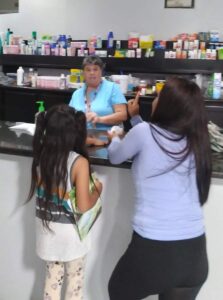
The surge of migrants at the southern border in the week before May 11 was the result of migrants’ fear of Title 8 restrictions and their frustration with the CBP One App. From May 8-15, our OSP-IHM Border Community spent mornings and afternoons at the Humanitarian Respite Center serving the increased number of migrants. The number of people and their needs were so many that it was hard to know where to begin. Many of those who had crossed had been detained for days by Immigration. They arrived hungry, sick and with only the clothes that they were wearing. Quite a few had been separated from family members and were desperate to locate their sons, daughters and husbands. We tried to use the online detainee locator service to help them find those who had been separated. But each time the system, which had not been updated, reported 0 results. It was heart-wrenching to see their disappointment and experience their anxiety.
Around May 15, the number of migrants at the Humanitarian Respite Center began to decrease. Although it is still a priority to respond to the basic physical needs (food, clothing and medicine) of the migrants, fewer people also means that we are able to sit with them, hear their stories and offer them compassion and encouragement. The smaller numbers allow us to respond to their emotional and spiritual needs.
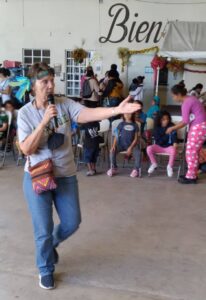
Because the number of those crossing into the US has decreased, there is a greater need to accompany migrants on the Mexican side of the border. Since last July, we have been volunteering on Thursdays at the Casa del Migrante in Reynosa, Mexico. We now are considering volunteering two days instead of just one in Mexico with the hope that we will be able to expand our presence to Senda de Vida II, an encampment of about 2,000 migrants on the outskirts of Reynosa. It is a ministerial adjustment that we are prepared to make because of the needs of the people and one that we foresaw when we chose McAllen, Texas, as our place of residence. We started this mission knowing that the work would call us to accompany our migrant brothers and sisters on both sides of the border.

